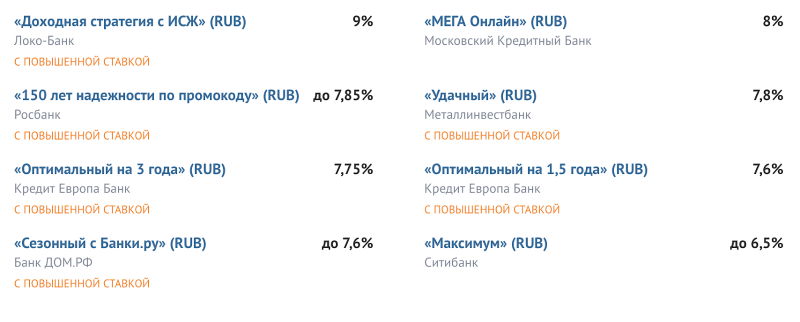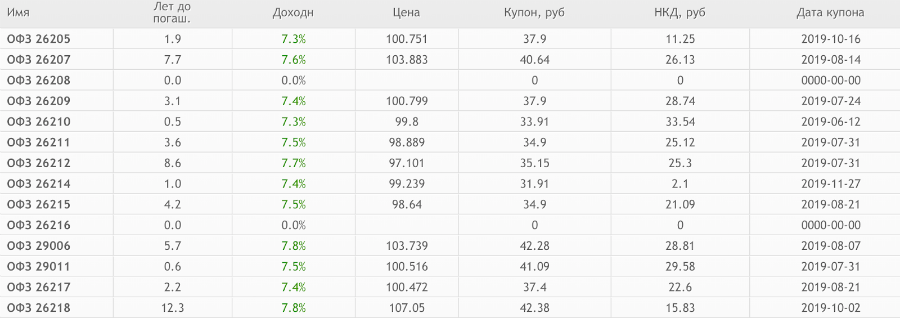How to start receiving passive income or at least protect your money: 5 real ways

Hello, Habr! I often talk about my experiments on the website, for example, in learning languages and putting them into practice . One of the areas of my experience in the last couple of years is the sphere of finance, because I want to understand it and find some ways to get passive income in addition to my main job.
Today I’ll tell you about five options that I personally tried, and which allow, if not to earn, then at least minimize the damage from inflation. And yes, even though some of them use the exchange, active speculation on it is still too difficult for me, so all the options are in the "for dummies" mode. Go!
Bank deposits
Despite everything, bank deposits remain the most popular financial instrument. This is the base from which everyone starts. It is clear that directly making money on a deposit in Russia today is difficult, but you can at least save money from the effects of inflation.
With the help of advisory services like Banks.ru and Compare.ru, you can find good deposit options with a yield of 6.5% to 9%. At the same time, according to forecasts of the Central Bank, in 2019 inflation should not exceed 5.2%. There are opinions that these forecasts are inaccurate due to a very loose approach to collecting statistics, and real inflation may exceed 10% - but even in this case, a good deposit will help at least reduce the damage.

Screenshot: Banks.ru
Plus of this option is high reliability, deposits up to 1.4 million rubles are insured by the state, and so far there have been no cases where depositors would not be returned money after a bankruptcy.
Federal loan bonds
Another investment tool that can be compared with a bank deposit in reliability is the purchase of federal loan bonds (OFZ) on the stock exchange. These are such securities that the state issues in order to attract additional money to the budget - and pays a percentage for it.
OFZ yield for June 2019 is from 7-7.9%, that is, approximately equal to the rates on most deposits.

Data: Smart-lab.ru
It is important to understand that operations on the exchange are not insured, like the same deposits, but OFZ is an extremely reliable tool. After all, these bonds were issued by the state, and if it does not pay for them, it will mean default with relevant events for the entire economy of the country and the banking sector as well.
IIS accounts
Another good option "for dummies" who have some money, but no knowledge and skills in order to invest it wisely. An individual investment account is an attempt by the state to increase the financial literacy of the population and attract private investors to the stock exchange.
It works like this: when using an account, you can get two types of benefits. The first of these is a tax deduction (13%). To receive it, you need to make money on the IIS, as well as have an official taxable income (PIT). For example, if you deposit 400 thousand rubles on the IIS, then a maximum of 52 thousand can be returned as a deduction - for this you will need a salary of 33 thousand per month.
There is only one minus - according to the rules, money should be in the IIS account for three years, you can withdraw it earlier, but then the deductions will have to be returned.
The second type of benefit when using IIS is exemption from income tax from transactions on the exchange. This allows you to combine IMS with the previous paragraph and buy OFZ with the funds you contributed. So you can get your 7% + percent and also take the deduction. At the same time, there is no need to make any special gestures - open an account with a broker, buy OFZ and apply for a deduction.
Roboadvising
Like many innovations, including financial, this method came to Russia from the United States. There, financial companies have long thought of automating the work of financial advisors. Usually such advisers are with funds, they analyze current market conditions and, in accordance with the parameters set by the investor, select options for investments.
There are a number of fairly successful systems in which money management is automated - for example, Wealthfront and Betterment. Initially, the service was needed to attract middle-class clients to exchange trading - they trusted their pension savings to the systems.
Now similar systems are appearing among Russian brokers. I experimented with one of these systems. The bottom line is simple, first in a question and answer format you need to give the system input data on the timing of the investment, the desired return and the acceptable level of risk. Then the robot selects one of the algorithms embedded in the system to select a portfolio of stocks, OFZs, etc.

If we tell the system about the unwillingness to take unnecessary risks, then the proposed portfolio will mainly consist of OFZs - this is reliable, but it will not work to earn millions. With greater risk allowed, you can get a portfolio that will potentially bring higher returns, but here you can already lose money.
Plus - you can start experiments with a small amount (from 10 thousand rubles), which is quite convenient. It is also important to understand that the robot itself does not buy or sell anything - it gives advice, and then you can follow them or not. Once in a certain period, the system rebalances the portfolio and offers to buy up some stocks and replace some stocks with others, depending on the current market situation.
Dividends
The exchange is associated with a “buy / sell” process, but in fact stocks can be bought not for speculation, but with the goal of generating additional income. There are a number of companies that pay dividends.
Sites like Compare.ru publish collections of companies that regularly pay good dividends.

An important point: in contrast to operations on IMS, dividends are taxed at 13%. Therefore, the income received will be credited to the brokerage account minus taxes.
That's all for today, thanks for watching! What tools do you use for passive or half passive income?
